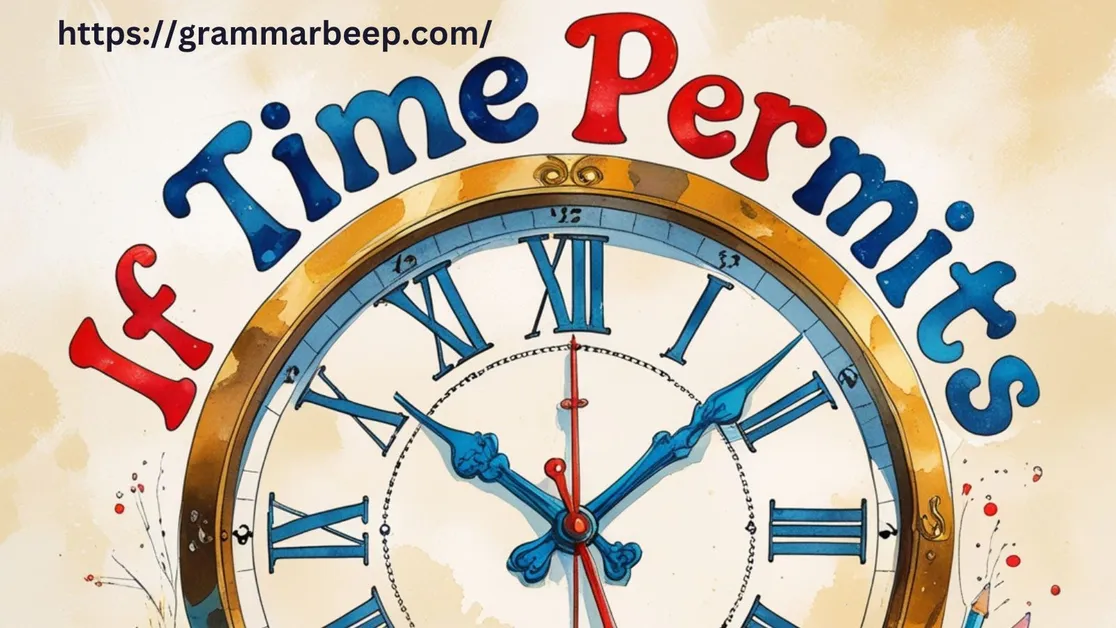When making plans, writing emails, or scheduling tasks, you often want to express that something will happen—but only if there’s enough time. The phrase “if time permits” is a polite and widely used way to say this. However, English offers a rich variety of alternatives that can make your communication clearer, more engaging, and sometimes more formal or casual depending on the context.
Along the way, you’ll encounter bolded key phrases to highlight important ideas. At the end, a handy table summarizes all these alternatives for quick reference.
Additionally, we’ll weave in LSI (Latent Semantic Indexing) keywords and NLP (Natural Language Processing) relevant phrases to deepen your understanding of time-related expressions in English.
Should Time Allow
This phrase has a formal tone and is perfect for situations where you want to show politeness without sounding too casual. It conveys hope but acknowledges time constraints clearly.
Example:
Email from Sarah to her team:
Hi Team,
We will review the quarterly report next week, should time allow. Please prioritize the urgent tasks first.
Best,
Sarah
Here, “should time allow” gently sets expectations. It’s a great polite way to say if time permits in professional emails or official announcements.
Pending Time Constraints
When time is a critical limiting factor—especially in project management or technical work—this phrase emphasizes that a plan depends on overcoming those limits.
Example:
Project update email from Mark to the client:
Dear Ms. Johnson,
We can integrate the new feature into the product roadmap, pending time constraints and resource availability. I will keep you updated on any changes.
Regards,
Mark
This expression highlights time constraints expressions clearly, making it suitable for formal settings where schedules are tight.
Time Willing
If you want a lighter, more casual phrase that personifies time, “time willing” fits perfectly. It’s concise and a bit poetic, suggesting hope that time cooperates.
Example:
Casual team chat message from Alex:
Hey everyone, let’s grab lunch tomorrow, time willing. I’ll send out a calendar invite if it looks good.
This phrase shines in informal contexts and adds a touch of charm while talking about plans dependent on time.
Contingent Upon Time
This phrase is very direct and formal, often used in official documents, invitations, or contracts to stress that an event or action depends strictly on time availability.
Example:
Corporate invitation email:
Participation in the workshop is contingent upon time and prior registration. Please RSVP at your earliest convenience.
It’s an excellent example of formal conditional time expressions and communicates clear boundaries.
Check out this: 21 Other Ways to Say “I’m Happy for You”
If Time Is Kind
Adding a bit of optimism, this phrase personifies time as a force that can be “kind” or “unfriendly.” It balances hope with reality nicely.
Example:
Email from Laura to a conference speaker:
We hope to extend the Q&A session, if time is kind to us after the main presentations. Thank you for your flexibility.
Using this phrase introduces a positive tone and fits well in both formal and informal settings.
If the Schedule Permits
Perfect for tightly organized events, this phrase emphasizes fitting something additional into an already busy timetable.
Example:
Event coordinator’s email to participants:
We plan to include a networking session at the end of the day, if the schedule permits. Please stay tuned for updates.
It’s one of the best time availability phrases for meetings, conferences, and workshops.
Assuming Time Is On Our Side
This optimistic expression reflects hope that time will allow more than initially planned.
Example:
Team meeting agenda email from Daniel:
We’ll cover the core topics first, assuming time is on our side to discuss additional questions afterward.
It adds a human touch and flexibility to your plans.
More for you: 20 Other Ways to Say “Good Morning Everyone”
Where Time Allows
This phrase is gentle and adaptable, implying that something extra will happen when time allows without guaranteeing it.
Example:
Professor’s note to students:
We’ll explore supplementary case studies where time allows during next week’s lectures.
It works well in academic and educational contexts.
In Time’s Favor
Here, time is portrayed almost like an ally. It suggests hope for favorable conditions but doesn’t promise them.
Example:
Meeting summary email from Olivia:
Additional topics will be discussed in time’s favor. If not, they will be deferred to the next session.
This phrase is great for flexible scheduling.
Given Adequate Time
This phrase stresses the importance of having enough time to do something properly, often implying quality over speed.
Example:
Project lead’s email to stakeholders:
Given adequate time, we will conduct a thorough analysis of the feedback before finalizing the report.
It suits formal discussions where thoroughness matters.
At Time’s Leisure
A somewhat poetic and old-fashioned phrase, it implies doing something unhurriedly when time allows.
Example:
Creative team leader’s email to writers:
Feel free to review the draft at time’s leisure before the final submission deadline.
Great for creative or intellectual environments where flexibility is encouraged.
For your interest: 27 Other Ways to Say ‘Yes’
As Time Permits
This classic phrase remains versatile, used to indicate a task will happen based on available time.
Example:
Customer support email from Jenna:
We will address each of your concerns as time permits throughout the week.
It’s widely applicable, from customer service to education.
Should Time Be Generous
A hopeful phrase that conveys a desire for more time than expected, often used in meetings or brainstorming sessions.
Example:
Workshop coordinator’s note:
We’ll explore advanced topics should time be generous during the session.
It suggests optimism without promising anything.
If Time Allows
This straightforward alternative is a close cousin to the original phrase but can feel more casual or conversational.
Example:
Email from Michael to his project team:
We’ll add a bonus training module if time allows after covering the basics.
Useful for informal and semi-formal communication.
If Time Is Available
A clear, no-frills way to indicate something depends on time, good for clarity in professional emails.
Example:
HR email regarding interviews:
Additional interview slots will be scheduled if time is available later this week.
It highlights time availability in meetings and schedules.
When Time Permits
Similar to “as time permits,” this phrase conveys actions that will take place when there’s enough time.
Example:
Email from Emma to volunteers:
Please submit your reports when time permits to ensure accuracy.
Good for polite, flexible requests.
If Circumstances Allow
Though broader than just time, this phrase often includes time as a key factor and implies conditions may vary.
Example:
Community organizer’s update:
We plan to hold the outdoor event if circumstances allow, including weather and time constraints.
Great for casual or formal announcements where multiple factors play a role.
You might also like: 20 Other Ways to Say “I Hope You Understand”
In the Event Time Permits
This phrase is formal and often found in legal or official documents, signaling conditional planning.
Example:
Contract clause:
Additional services will be provided in the event time permits and resources are available.
It’s useful for precise conditional intent expressions.
Subject to Time Availability
This legal-sounding phrase clearly states plans hinge on time being free.
Example:
Vendor contract email:
Delivery of materials is subject to time availability and shipping schedules.
It’s ideal for professional or transactional communication.
When Schedule Allows
This phrase highlights the role of a fixed timetable, suitable for workplaces and structured environments.
Example:
Manager’s email to staff:
Training sessions will be held when schedule allows, likely in the coming quarter.
It fits scheduling based on time contexts well.
Provided Time Is Sufficient
This is a formal and precise way to indicate that a task or event depends on having enough time.
Example:
Project manager’s note:
Testing will begin next month, provided time is sufficient to complete preparations.
Great for setting expectations clearly.
Summary Table of Alternatives to “If Time Permits”
| Alternative Phrase | Typical Use Case | Tone | Example Scenario |
|---|---|---|---|
| Should Time Allow | Formal emails | Formal | Reviewing reports in work emails |
| Pending Time Constraints | Project management | Professional | Feature integration update |
| Time Willing | Casual conversations | Informal | Casual team lunch plan |
| Contingent Upon Time | Official documents | Formal | Workshop participation invite |
| If Time Is Kind | General use | Optimistic | Extending meeting Q&A |
| If the Schedule Permits | Events, conferences | Neutral | Adding networking session |
| Assuming Time Is On Our Side | Optimistic planning | Casual/Formal | Covering extra agenda topics |
| Where Time Allows | Educational settings | Neutral | Exploring case studies |
| In Time’s Favor | Flexible scheduling | Optimistic | Discussing extra topics |
| Given Adequate Time | Formal project planning | Formal | Conducting detailed analysis |
| At Time’s Leisure | Creative/intellectual | Poetic | Reviewing drafts |
| As Time Permits | Versatile | Neutral | Customer support responses |
| Should Time Be Generous | Workshops/meetings | Hopeful | Exploring advanced topics |
| If Time Allows | Casual/professional | Neutral | Adding bonus training |
| If Time Is Available | Clear professional | Neutral | Scheduling interviews |
| When Time Permits | Flexible requests | Polite | Submitting volunteer reports |
| If Circumstances Allow | Broad conditional | Neutral | Planning outdoor events |
| In the Event Time Permits | Legal/formal documents | Formal | Contract clauses |
| Subject to Time Availability | Transactional/professional | Formal | Delivery scheduling |
| When Schedule Allows | Structured workplace | Neutral | Scheduling training sessions |
| Provided Time Is Sufficient | Precise professional | Formal | Testing preparation |
FAQs
What is a casual way to say “if time permits” in conversation?
You can say “time willing” or “if time allows” for a relaxed, conversational tone.
Can these phrases be used in formal writing?
Yes, options like “contingent upon time” and “pending time constraints” suit formal or professional writing.
Are there phrases that sound more poetic or creative?
Yes, try “if time is kind” or “at time’s leisure” for a more expressive, creative feel.
Which phrases work best for meetings or presentations?
Use “if the schedule permits” or “assuming time is on our side” to gently manage expectations.
Is “should time allow” the same as “if time permits”?
Essentially yes, but “should time allow” has a slightly more formal and elegant tone.
Conclusion
Having a variety of ways to say “if time permits” enriches your communication and allows you to express nuances depending on the context—whether formal or casual, optimistic or matter-of-fact. These alternatives support flexible scheduling phrases, conditional planning phrases, and cover a range of tones and settings.
Using these expressions helps avoid repetition, brings clarity to your time contingent phrases, and ensures your audience understands your message with the right level of politeness and precision. Next time you draft that email or schedule a meeting, try swapping out “if time permits” for one of these fresh options. You’ll sound more confident and polished.

Zoey Alba is an experienced blogger and language enthusiast with a passion for helping readers master the art of grammar. With years of expertise in writing, editing, and content creation, Zoey shares practical tips and insightful advice to make grammar accessible for all. When she’s not writing, Zoey enjoys reading, learning new languages, and inspiring others to write with confidence.
